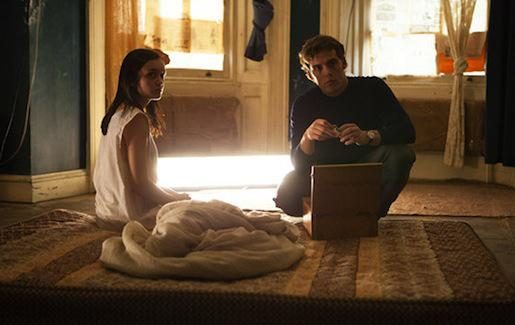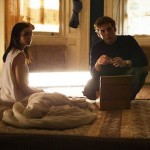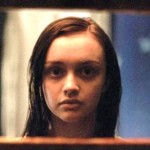The phrase “inspired by true events,” once powerful enough to instill fear into any teenager, now holds little bite in the world of horror. At this point, we’ve all become far too jaded at the idea of a “true story,” especially since most of these tales turn out to be little more than “Hey, there was once a rumor of this thing happening, but no one actually got any proof of it and no one will go on record talking about it.” All that being said, the en vogue horror topic is possession, and though I think it’s on its way out (we can only see the same story so many times, Hollywood), John Pogue’s The Quiet Ones is still worth a look, if only for effective atmosphere and some great moments of suspense (which, unfortunately, is really all it offers).
“Inspired by true events,” The Quiet Ones presents a story loosely based on a Canadian experiment in which researchers believed subjects could conjure an entity from their collective wills — mind over matter, if you will. (The idea was also toyed with in “The Apparition,” an awful, convoluted film that severely missed the mark.) The Quiet Ones gives us Joseph Coupland (Jared Harris, “The Mortal Instruments: City of Bones“), an Oxford University professor who is conducting an experiment on a young girl whom he asserts is mentally ill, not possessed, as she herself believes. (And already, the “true story” is left behind . . .) With his acolytes Krissi Dalton (Erin Richards) and Harry Abrams (Rory Fleck-Byrne, “Vampire Academy“) at his side, his goal is to get young Jane (Olivia Cooke) to express telekinetic powers through the physical manifestation of negative brain activity. He proposes that this method of extraction will lead to the cures of many mental illnesses – basically, he wants to physically remove the negative influences that plague a patient. Prof. Coupland hires young Brian McNeil (a nod to Regan MacNeil of “The Exorcist?”) to chronicle the experiment, and each member of the team has a role — Brian documents, Krissi medically monitors the subject, Harry is the engineer/tech guy, and Prof. Coupland leads the charge as the experienced one of the group. We learn that he once worked with a similar patient named David, who was also manifesting strange behaviors and blamed them on the presence of a being he called Mr. Gregor. Prof. Coupland explains that his time with David ended when his religious mother became uncomfortable with the experiments and he reports that David is currently living a relatively normal life.
Now, in 1974, the University tells Coupland that his funding has been cut off, so he decides to move his experiment to (of course) a dilapidated, isolated mansion where they can proceed in peace. Brian is told he’s not allowed to speak or interact with Jane (a rule he breaks immediately, naturally), and that he must capture every moment. The experiment goes through many stages, including pseudo-séance sessions in which Jane is encouraged to bring forth “Evie,” a girl who died in some sort of fire and is reluctant to speak to the group. In the meantime, “Evie” frequently causes Jane to harm herself and appears to be a malevolent spirit in control of the situation. Oftentimes, we’re not sure if they’re dealing with Jane or with “Evie,” which leads to most of the suspenseful moments in the film.
Writer/director Pogue and his co-screenwriters Craig Rosenberg and Oren Moverman adapt a screenplay written by Tom de Ville into a film that is all atmosphere and little substance. The film is set up as a sort of found-footage tale, but there are numerous instances when this is tossed aside in favor of a standard objective point of view. It’s a true slow-burner, with very little happening until approximately halfway through the story. That being said, it’s not a boring film, as there are many suspenseful moments where you’re convinced someone is going to be harmed (I won’t reveal how often you turn out to be right). It uses the clichéd mansion well, presenting us with dark scenes that put the audience on the edge of their seats. However, there is very little payoff to that suspense, and that’s where this film fails as a quality picture. As with most horror movies nowadays, the ending is haphazardly thrown together with an underdeveloped backstory that leaves us with many unanswered questions. Symbols and visions are presented that are not fully explained and the “truth behind it all” insufficiently explains the situation at hand.
The Quiet Ones is worth a look, just because so few horror movies actually bring tension to the experience anymore; however, like most recent horror films, the story is lacking, there are too many plot holes, and you really don’t feel much empathy for the characters involved. While the suspenseful atmosphere is certainly effective, the film just won’t hold up on subsequent viewings, which, I think you’ll agree, is what truly makes a horror film a classic. Maybe next time.






'Movie Review: The Quiet Ones (2014)' have 4 comments
April 27, 2014 @ 11:34 am Cigario
I’m convinced Hollywood doesn’t know how to make a good horror movie anymore.
April 27, 2014 @ 1:03 pm Ginx
Jared Harris is creepy enough.
April 27, 2014 @ 4:52 pm Humble Pie
It’s time for a new staple Hollywood. I can’t be the only one who dismisses a movie once they see the poor possessed girl twisting and contorting in a trailer.
April 27, 2014 @ 6:18 pm Terbo
Premise sounded interesting too … :(